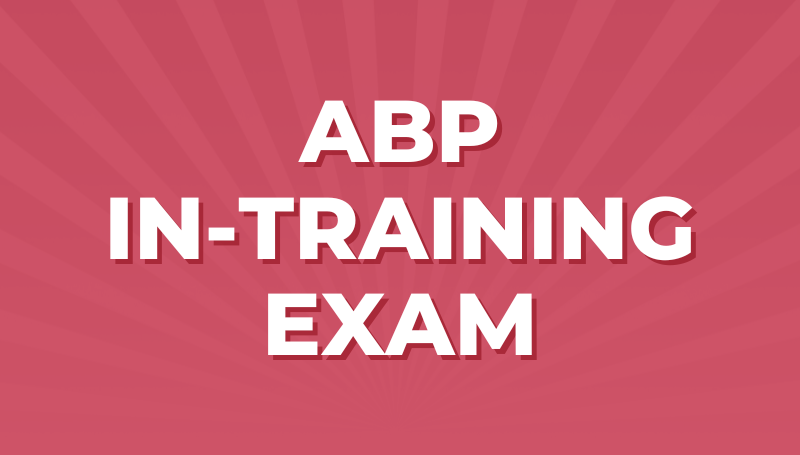
What is the ABP In Training Exam?
The ABP In Training Exam (sometimes called ITEs or the Pediatrics In Service Exam), is an exam you take during each of your medical residency years to track your progress through the training. The ABP ITE is similar in content and format to the ABP Certification Exam, so it can also be used to evaluate your preparedness for that exam.
If you’re a resident in one of the core years of your residency training in pediatrics, med-peds, and other general pediatric combined disciplines (e.g. pediatrics-genetics, pediatrics-emergency medicine, and pediatrics-anesthesiology, etc.) you can take the ITE.
Chief residents who are completing their Pediatric R3 year or Med-Peds R4 year are also eligible to take ITE.
How many questions are on the exam?
There are about 150 multiple choice questions for you to answer during the 3-hour ABP In Training Exam. These questions can cover any topic from the ABP Certification Exam content outline.
What’s the best pediatrics ITE prep?
The main purpose of the Pediatrics ITE is to enable you (and your PD) to assess strengths and weaknesses in your knowledge of general Pediatrics topics and compare your results year over year to gauge your progress.
When it comes to your Pediatrics ITE prep, avoid cramming. Focus on studying effectively throughout your residency, using strategies like spaced repetition and reviewing concepts as you see them in your patient cases.
How to study for Pediatrics ITE
Any topic from the ABP content outline is considered fair game to be included on the Pediatrics ITE. However, unlike the boards, there’s no penalty for guessing and no real way to fail.
You’re not advised to prepare for your ABP ITE. And we agree with this advice! If you want to get the most out of your ITE score, it needs to be a true representation of your knowledge. So no cramming! The way we recommend “prep” for your ITE exam is to do the same amount of studying you’d do throughout residency—increasing your knowledge over time in order to solidify it into your long-term memory. Here’s how to think about it.
You can maintain a long-term study plan by following a board prep study plan (which will also prep you for the ITE), or reviewing relevant literature for your patient cases while patient interactions are fresh in your mind. The best way to stay on track in your board prep long-term is to do both.
Your board prep plan should be mapped to the content in your board blueprint, so you won’t miss any concepts that could be on your board exam. It will keep you moving through all the medical information you need to learn throughout residency, and the best plans will even implement spaced retrieval and other brain hacks so that you create long-term memories with the information.
Reviewing literature as you see new cases is a great way to create stronger encoding of the information you’re learning. When you experience an event (like a new patient case), all the information is funneled to the hippocampus and converted into a neural code that can be stored and accessed, first as working short-term memory and later as distributed long-term memory. This episodic memory contains all relevant information of the event—the “who, what, when, why, and where,” the emotions, the sensations, and the personal importance. When you combine that with reviewing literature, you’re able to connect that patient with the material, forming deeper memories of that concept.
Pediatrics ITE results
You take the ITE sometime in July, and your score will be released as early in September as possible. Score reports for pediatric residents go to the pediatric program director and coordinators only. Med-peds resident score reports go to the med-peds program director and coordinators only.
Because the ITE is designed as an abbreviated version of a certifying exam and is based on the same content outline, you can familiarize yourself with the ABP exam and—to some extent—use your score to predict your performance on the Certification exam.
Remember—this is a marathon, not a sprint! Keep up with your daily studies—do not cram for your ITE exam. Make time for yourself to do things you enjoy, too. Dedicating a little time to those things each day will keep you feeling refreshed and motivated, helping you stay on track with your goals!


